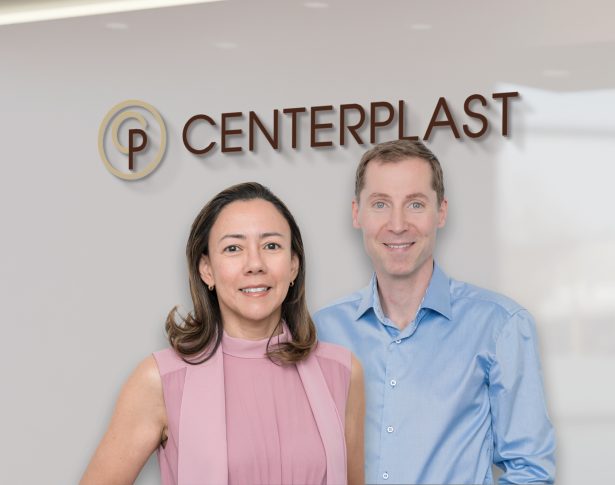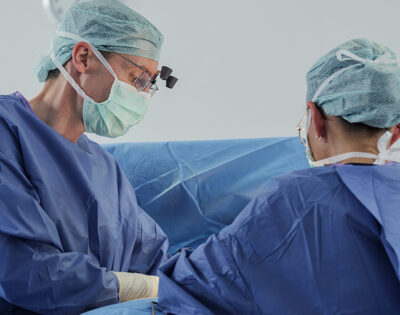Our standards for your satisfaction
Dr. Santos Stahl has Brazilian, German and European specialist qualifications. She specialized in the field of facial surgery in Stuttgart (Prof. Gubisch) and even more intensively in the field of ear surgery in Paris (Dr. Firmin). She deepened her knowledge and perfected her techniques through fellowships in the USA with outstanding world-leading plastic surgeons (Rod J. Rohrich, MD, FACS; Dr. Renato Saltz, MD).
PD Dr. Stahl was born in Paris and studied in Freiburg and Berlin. A DAAD scholarship enabled him to gain an insight into plastic and aesthetic surgery in Brazil. He later gained professional experience in Switzerland and – after a rigorous selection process thanks to an ASAPS scholarship – in the USA. The visiting plastic surgeons are recognized and distinguished world leaders in the field of cosmetic surgery (Prof. Dr. Foad Nahai, MD, FACS; Prof. Dr. Felmont Monte Eaves, MD, FACS; Prof. Dr. Albert Losken, MD; Prof. Dr. Mark Allen Codner, MD, FACS; Dr. Renato Saltz, MD; Prof. Dr. Sherrell J. Aston, MD; Prof. Dr. Daniel C. Baker, MD).
What our patients say

Sterility
At CenterPlast, the highest standards apply to the reprocessing of surgical instruments. The team makes no compromises when it comes to sterility. For this reason, the doctors do not entrust the sensitive and responsible task of sterilizing the instruments to others: all instruments in the group practice are reprocessed by specially trained staff using modern equipment from renowned manufacturers in accordance with the requirements of the Robert Koch Institute. All work steps are meticulously checked and documented on a regular basis.
Certified products
We only use certified products and implants. The marking of a product with the CE mark (Conformité Européenne), the TÜV (Technischer Überwachungsverein) or the ISO (International Organization for Standardization) test mark indicates compliance with a minimum standard. Certification does not allow any conclusions to be drawn about how effective or well tolerated a product is. The CenterPlast specialists rely on fact-based data (EBM: evidence-based medicine). CenterPlast products not only meet the minimum requirements of certifications, but also the high demands of our medical specialists. We compare certified products with each other and offer our patients the best possible and safest treatment, true to our motto: Competence – Safety – Comfort.

OUR SPECIALISTS
Our experienced plastic surgery specialists

Security checklists and standardized digital documentation
Just as a pilot checks his airplane before every take-off, the surgeon must check a large number of parameters for the patient’s safety before every operation. As a patient, you have to be able to rely on the doctor to do the right thing. Especially when the operations have become routine, concentration must not wane. Standardizing work processes and keeping safety checklists help to avoid errors. The CenterPlast group practice therefore systematically carries out a comprehensive survey of potentially medically relevant information. All findings are meticulously documented digitally.
All employees receive regular training on new laws, regulations, directives, guidelines and recommendations. The team takes its responsibility very seriously.
Expert activity
PD Dr. Stahl has been an expert for the employers’ liability insurance associations since 2006. Dr. Stahl has many years of experience as an expert for insurance companies and as an expert witness at various courts. Above all, the work of an appraiser requires thorough and rigorous preparation. The expert must not miss any relevant facts. Dr. Stahl evaluates objectifiable findings according to the current state of knowledge in medical science. The comprehensive examination and findings must be carried out reliably, in a standardized form and according to recognized procedures. This is followed by a systematic analysis. PD Dr. Stahl discusses complex issues in understandable language and in a comprehensible form.
Guidelines
Medical work also includes research, for example as part of a medical doctorate or habilitation. The ability to incorporate scientific findings into rational treatment decisions is strengthened through independent scientific activity.
The habilitation is the highest-ranking university examination in Germany, with which the teaching qualification is determined as part of an academic examination procedure. If the strict requirements are met, the Faculty of Medicine will grant authorization to teach plastic and aesthetic surgery.
With the habilitation it was determined that PD Dr. Stahl can represent the subject of plastic and aesthetic surgery in its full breadth in research and teaching.
Leadership competence
Professional experience in a managerial role strengthens the sense of responsibility and the ability to solve complex and difficult challenges. PD Dr. Stahl has spent years preparing for this role. In 2015, he became senior consultant and permanent deputy medical director at the BG and University Hospital in Tübingen. From 2016 to 2018, he was Clinic Director at Klinikum Lüdenscheid, a maximum care hospital and teaching hospital of the University of Bonn.
Research
Science is about asking questions and looking for answers. The pursuit of new knowledge is a basic need of a scientist.
Fr. Dr. Stahl as early as 2001 while examining heart muscle cells.
From 2001 to 2002, Dr. Stahl carried out his experimental doctoral thesis at the Max Planck Institute of Immunobiology in Freiburg. Dr. Stahl conducted his first clinical research in 2005 and became a certified investigator in 2009. This was followed by intensive research work, which was honored in 2015 with the award of his habilitation and numerous research prizes.
Fri. Dr. Stahl and PD Dr. Stahl are continuously dedicated to research and the scientific evaluation of treatment results in order to verify the success of treatment and to continuously improve our treatment results.
Comprehensive clarification
After a thorough examination of the patient, Dr. Adelana Stahl and PD Dr. Stéphane Stahl see their main task as providing comprehensive information about the risks and alternatives.
Obtaining a second medical opinion before making a decision can help to dispel any doubts. The specialists are also happy to help patients with this. The team at the group practice offers you the opportunity to obtain a differentiated opinion from a second specialist on site.
Always there for you in an emergency
After an operation, the surgeon at the CenterPlast group practice is available for you 24 hours a day in an emergency.
Emergency number outside office hours: +49 681 30140112


Personal advice
We take time for you and offer you customized advice and treatment for your individual result.




